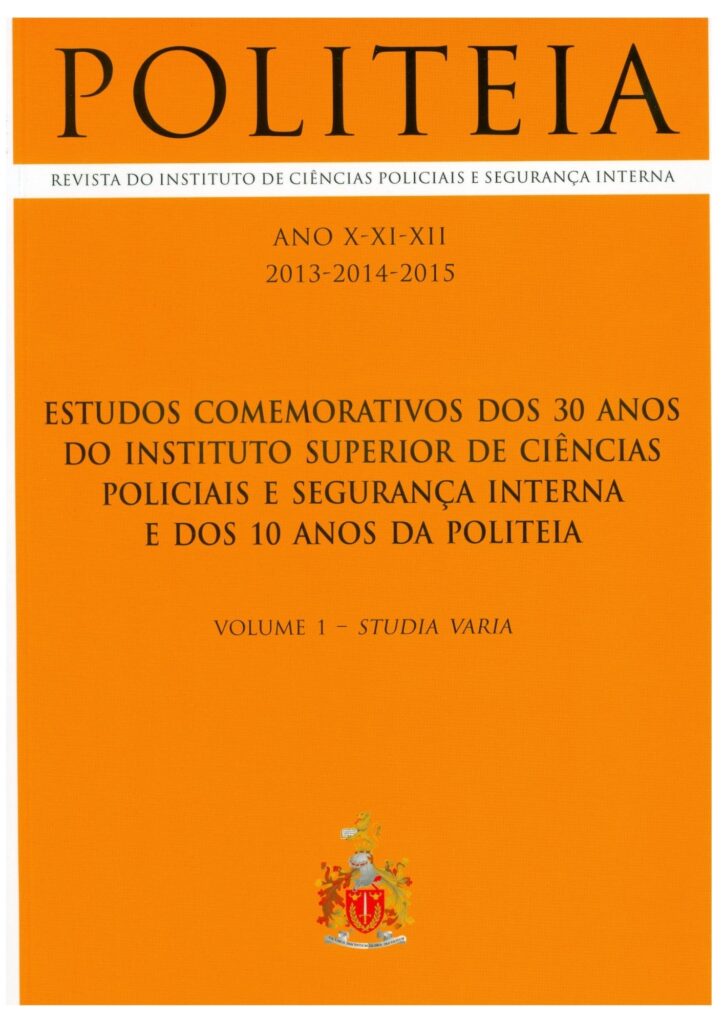Stresse e Burnout em Agentes da Polícia de Segurança Pública
Palavras chave:
Nas sociedades contemporâneas, marcadas por uma rápida industrialização e modernização dos instrumentos de trabalho, bem como pela crise económica e pela necessidade constante de vencer num mercado de trabalho cada vez mais competitivo, os indivíduos são absorvidos pelas pressões quotidianas que colocam em jogo o equilíbrio emocional, físico e social, com marcadas consequências no desempenho laboral. A satisfação profissional dos trabalhadores depende de fatores tão distintos como da saúde, das compensações monetárias, da comunicação e envolvimento entre trabalhadores e chefias, da organização do serviço e também das condições de trabalho. Por vezes basta que um destes fatores esteja ausente para que o desempenho do profissional decresça ou provoque sentimentos conducentes ao stresse e, em última instância, ao burnout. Reflectir sobre a qualidade de vida no trabalho está na ordem do dia pois trata-se de compreender e respeitar os problemas individuais no ambiente laboral, atendendo aos aspetos comportamentais e à satisfação profissional dos trabalhadores (Detoni, 2001). Grande parte do dia dos indivíduos é ocupado com o trabalho, pelo que importa determinar sob que condições o mesmo se processa, para que o ambiente profissional seja o mais adequado e para que os profissionais mantenham a sua motivação e assegurem a eficácia laboral. O stresse e o burnout têm sido considerados os principais fatores prejudiciais à saúde dos trabalhadores e com repercussões negativas nas organizações. O stresse associado ao trabalho existe em todas as profissões mas as investigações mais atuais colocam em destaque o caso específico da polícia uma vez que se trata de uma profissão em que a resistência psicológica é todos os dias colocada à prova. O stresse resultante do trabalho policial tem um preço elevado para o polícia como indivíduo, para a organização policial e, em última instância, para a sociedade civil, considerando-se que estes são motivos suficientes para justificar a pertinência e o interesse que esta problemática tem suscitado nas investigações com polícias (Malach-Pines & Keinan, 2006).
In contemporary societies, marked by the rapid industrialisation and modernisation of work tools, as well as by the economic crisis and the constant need to win in an increasingly competitive labour market, individuals are absorbed by the everyday pressures that put at stake the emotional, physical and social balance, with marked effects on labour performance. The professional satisfaction of workers depends on different factors like health, monetary compensation, communication and engagement between workers and managers, service organisation and working conditions. Sometimes the simple absence of one of these factors is enough to decrease the professional’s performance or to trigger feelings that lead to stress and, ultimately, to burnout. Reflecting on the quality of life at work is on order of the day, as it entails understanding and respecting individual problems in the workplace, taking into account the behavioural aspects and the job satisfaction of workers (Detoni, 2001). A great part of an individual’s day is spent with work, for which it is important to determine under what conditions the latter takes place, so that the professional environment is the most appropriate and professionals can maintain their motivation and ensure the effectiveness of labour. Stress and burnout have been considered the main detrimental factors to the health of workers, and with negative impact on organisations. Work-related stress exists in all professions, but most current investigations highlight the specific case of the police, because it is a profession in which psychological resistance is put to the test every day. Stress resulting from police work has a high price for the police officer as an individual, for the police force and, ultimately, for civil society, considering that these are sufficient reasons to justify the relevance and the interest that this issue has sparked in investigations with police officers (Malach-Pines & Keinan, 2006).
Versão original
Versão original
Outros artigos nesta edição
-
Editorial
Manuel Monteiro Guedes Valente
-
O futuro numa década: Os desafios económicos e securitários de Portugal
Sónia M. A. Morgado e Sérgio Mendes
-
A Cidade do Rio de Janeiro e a Segurança – Os Jogos Olímpicos de 2016
Maria de Fátima Magalhães da Rocha
-
Revolucionar ou Reajustar a Segurança Privada: Alterações e crítica à Lei n.º 34/2013, de 16 de Maio
David Marcos Borralho Pereira
-
Clarificando o Conceito de Segurança
Luís Filipe Jorge de Almeida Guerra
-
Invasões Biológicas e Segurança: uma frente descurada? Bio invasions and Security: a neglected front?
Jorge Fonseca de Almeida
-
Os Serviços de Informações: Actividade, Organização, Poder e Controlo
Hélder Valente Dias
-
A radicalização salafista-jihadista na Europa: o caso dos imigrantes de segunda e terceira geração conectados com o Islão
Marina Soares
-
A dupla perspetiva da norma fundamental em Hans Kelsen
José Joaquim Monteiro Ramos
-
Regime jurídico do correio eletrónico: dos momentos do correio eletrónico…à consagração de uma proteção jurídica uniforme pela Lei do Cibercrime
Nuno Ricardo Pica dos Santos
-
Fórmula Típica do Artigo 241-C do ECA Cibernético: ecos do Direito Penal do Inimigo?
Stenio Santos Sousa
-
O Princípio da Liberdade – Princípio da Legalidade da Detenção nos Tribunais Internacionais
Maria João Simões Escudeiro
-
Produtos Explosivos: Procedimentos e Notas Jurídico-Policiais
Francisco António Carrilho Bagina
-
Direito à Proteção Familiar
Alberto Peixoto
-
A Responsabilidade Social das Empresas em Tempos de Crise. Milton Friedman Revisitado
Maria Augusta Teles
-
Stresse e Burnout em Agentes da Polícia de Segurança Pública
Nuno Russo
-
Revisitando a Galeria de Criminosos Célebres em Portugal. História da Criminologia Contemporânea (1896-1908)
Nuno Caetano Lopes de Barros Poiares




